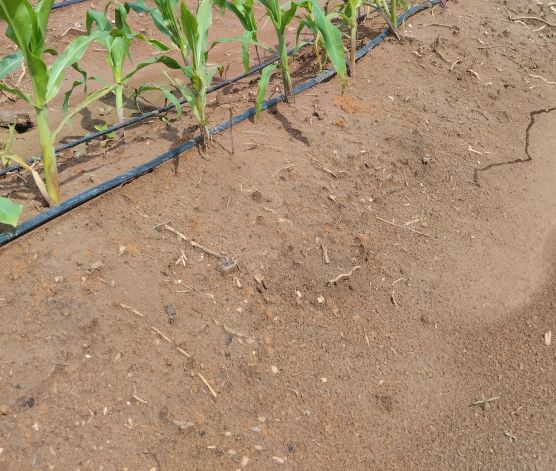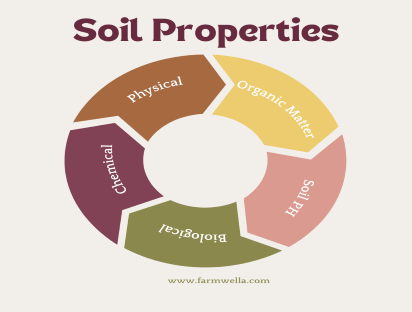
Every action on the soil will have an effect on it, either positively or negatively. Soil management is doing everything possible to understand what should and should not be done on the soil, controlling the amount and method of nutrients applied to the soil, knowing the right amounts of nutrients available in the soil and the amounts of nutrients the soil lacks, and figuring out the amount of nutrient needed in order to maximize agricultural output and reduce nutrient losses that might lead to soil issues.
You may have done soil testing or even planted on the soil and it may have yielded well, but no matter how fertile the soil is, it is necessary to understand its management because of the significant impact on the farm output. However, before delving into soil management, you must fully understand soil and its properties.
There are a few elements that make up soil: its physical properties, chemical properties, biological properties, soil organic matter, and soil pH. For soil to be productive, there are ideal levels that it must reach in its properties.

Physical Properties
When evaluating a soil’s physical features, factors to consider include its bulk density, porosity, consistency, capacity to retain water, soil texture, soil color, and soil structure. The effects of air and water on the soil will depend on its physical characteristics.
Chemical Properties
The NPK (Nitrogen, Phosphorus, and Potassium) is frequently the first thing that comes to mind when the chemical properties of the soil are addressed. It is very important to note that plants require those three elements (NPK) in large quantities in order to have a positive impact on the crops planted on them, but that is not the only thing that crops require in order to survive; they also require elements like Manganese, Aluminum, and Copper, though in smaller amounts, in order to survive.
Biological Properties
Good soil will provide a home for a variety of species, including earthworms, nematodes, fungi, algae, and bacteria, among many others. This is what is meant by the biological qualities of the soil, which are mainly measured by the soil’s life.
Soil Organic Matter (SOM)
The amount of organic matter in the soil is generally determined by how black the soil is. Organic matter in soil influences other properties, including physical and biological properties. If you can monitor the SOM level, you’ll be able to tell whether or not your crop is doing well. All of the necessary plant nutrients are present in soil organic matter since it is mostly made up of plant leftovers. As a result, accumulating organic matter serves as a plant food source.
Soil pH
The soil pH is a measurement of its acidity or basicity. The pH of the soil is affected by chemical interactions between soil constituents and water. It is crucial to do a soil pH test in order to determine whether the soil contains the necessary amount of acid for plant growth. The ideal pH range for most plants is 7.5; if a pH test is conducted and the result is below 5.5 or over 7.5, this might have a significant negative impact on the plants.
How To Manage Soil Nutrients
There are various ways to manage the soil nutrient, and they can be based on the physical, chemical, and the organic matter aspects of the soil:
Physical Management
- Making beds
This is one method of managing soil nutrients. You make beds to avoid compacting the soil’s bulk density; making beds make the soil porous, which increases the physical qualities of the soil and makes it easier for crops to grow in the soil. The deeper you make your bed, the better it is.
- Mulch
Mulch offers a variety of advantages, one of which is managing soil nutrients. The mulch helps in preventing the soil’s water from evaporating when it is sunny. Using mulch on the soil helps to keep the soil moist and reduces soil compaction. There are two kinds of mulch: organic mulch and inorganic mulch. At Farmwella, we make use of plastic mulch(inorganic), which is one of the most often used mulches.
Chemical Management
This entails the application of fertilizers to the soil, which is ineffective since you are essentially feeding the crop rather than the soil. Fertilizers do not manage soil nutrients adequately, even if they are effective on crops.
Increase of the Soil Organic Matter
There are a variety of strategies to improve soil organic matter, but the two most common methods are applying manure and rotating crops.
- Manure
Applying items like manure can help boost the soil’s organic matter and will help you manage soil nutrients the best. Manures are organic compounds gotten from animal, human, and plant waste that have complex organic forms of plant nutrients.
- Crop rotation
Crop rotation refers to the planting of several crop varieties in various agricultural locations throughout various growing seasons. It is difficult for the soil to retain nutrients when the same crop variety is put on it consistently throughout the growing season. Crop rotation will enrich the soil with additional plant debris and green manures.
Take Away
Every farmer should become proficient in managing the soil’s nutrients, and our monthly 10-day Farm Setup Bootcamp is a must-attend event if you’re curious and open to learning more about all you need to know about managing the soil nutrient. For additional information or to sign up, click the link below https://farmwella.com/fsb/